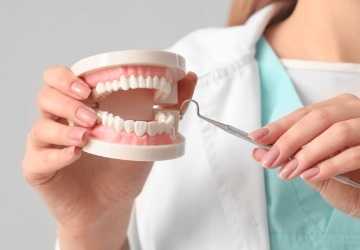The Importance of Regular Dental Check-Ups
Our teeth are often taken for granted. We use them for chewing, speaking, and expressing emotions through smiles and frowns. However, despite their constant use, dental health often takes a backseat in our overall well-being. Here's where regular dental checkups come in. By scheduling regular checkups, your dentist can identify possible problems early on and stop minor issues from becoming more serious and expensive.
For instance, during a regular dental checkup, your dental team thoroughly examines your teeth, gums, and oral cavity for any signs of cavities, gum disease, oral cancer, or other dental issues, ensuring early detection and prompt treatment to maintain optimal oral health.
This blog post explores the significance of routine dental examinations, highlighting their benefits and discussing the various risks associated with neglecting them. It also provides a detailed breakdown of a dental checkup procedure.

Preventive Benefits of Regular Dental Check-Ups
Frequent dental checkups have many preventive advantages that can help you keep your mouth in good condition and steer clear of future, expensive dental procedures. By keeping these regular appointments, you enable your dentist to spot possible problems early on and take appropriate action to stop them from getting worse and becoming more complicated.
Avoiding Major Dental Procedures
Early detection of dental issues is one of the main benefits of routine dental checkups.
Dental issues like cavities, gum disease, or oral cancer may not present noticeable symptoms until they have progressed significantly. In these consultations, your dentist can diagnose and address these issues quickly, possibly sparing you from later, more involved and costly procedures.
Professional cleanings and routine examinations are essential for avoiding gum disease and tooth decay. During these visits, plaque and tartar buildup—which can cause these conditions—are effectively removed, lowering the possibility of developing new issues.
Early intervention through preventive care can help you avoid costly procedures like root canals, gum surgery, or even tooth extractions.
Maintaining Oral Hygiene
Routine dental examinations help to maintain the best possible oral hygiene in addition to identifying and treating dental problems. Professional cleanings get rid of tough tartar and plaque buildup that is impossible to get rid of with just brushing and flossing. This thorough cleaning helps prevent the accumulation of bacteria, which can lead to inflammation, infection, and gum disease.
Moreover, your dentist can provide personalized guidance on proper oral hygiene techniques and recommend products or strategies tailored to your specific needs. With this individualized approach, you are guaranteed to have the information and resources needed to maintain optimal oral health in between dental appointments.
Detailed Breakdown of a Dental Check-Up Procedure
Initial Consultation
When you arrive for your dental appointment, a patient coordinator will greet and guide you through the necessary paperwork, such as verifying insurance information and completing new patient forms. After everything is finished, a member of the team will lead you to the treatment area, where they will go over your medical and dental histories and any worries or problems you may be having.
Diagnostic Tests
Digital X-rays of your teeth will be taken during the initial consultation for the dentist to review. These X-rays help identify potential issues like cavities, gum disease, or other dental problems that may not be visible during a visual examination.
Your dentist may also perform additional diagnostic tests, such as:
• Bite imprints to detect jaw malformations affecting your bite
• Extractions of fluids from swollen gums or abscesses to check for infections
• Referrals to specialists for signs of bone degeneration or malformation
• Surgical removal or biopsy of suspicious tissues
• Swabs of mouth sores
These diagnostic tests help your dentist develop a comprehensive understanding of your oral health and create a personalized treatment plan.
Cleaning Process
After the initial consultation and diagnostic tests, your teeth will be thoroughly cleaned by the dental hygienist. This process typically involves the following steps:
1. Scaling: The hygienist will scrape plaque and tartar buildup from your teeth using tiny metal instruments. In contrast to tartar, which is a hardened plaque that needs to be professionally removed, plaque is a sticky layer of bacteria that, if left unchecked, can cause cavities and gum disease.
2. Polishing: After your teeth are free of plaque and tartar, the hygienist will use a strong electric brush and gritted toothpaste to polish them and remove any remaining debris.
3. Flossing: The dental hygienist will use floss to remove any leftover plaque or food particles between each tooth.
4. Rinsing: You will be asked to thoroughly rinse your mouth to remove any leftover particles from the cleaning procedure.
5. Fluoride Treatment: The hygienist may use fluoride gel, foam, or varnish as a final treatment to help fortify your enamel and prevent cavities.
Understanding the Risks of Neglecting Dental Check-Ups
Neglecting regular dental checkups can have severe consequences for your oral and overall health. Here are some of the risks associated with skipping these crucial appointments:
The Development of Severe Dental Issues
● Tooth Decay and Cavities
One of the most immediate risks of neglecting dental health is the development of tooth decay and cavities. Cavities result from plaque, a sticky film of bacteria that erodes the tooth enamel through the production of acids. Without proper dental care, these cavities can deepen, causing pain, infection, and even tooth loss.

● Gum Disease
Periodontal disease, another name for gum disease, can also be caused by neglecting dental health. This disorder develops when tartar and plaque build up along the gum line, causing gum inflammation and infection.
From mild gingivitis, which is characterized by red, swollen gums, to more severe forms like periodontitis, which may cause bone loss and gum recession, gum disease can take many different forms. In advanced stages, untreated gum disease can even result in tooth loss.
● Systemic Health Risks
Perhaps less widely known are the systemic health risks associated with neglected dental health. An increasing body of research has connected respiratory infections, diabetes, and heart disease to dental health.
Poor dental hygiene can allow harmful bacteria to enter the bloodstream, potentially contributing to inflammation and infection in other parts of the body. For example, among other cardiovascular problems, persons with advanced gum disease may be more susceptible to heart attacks and strokes.
Increased Healthcare Costs
• Costly Dental Procedures
When dental issues are left unaddressed, they often require more invasive and expensive treatments. For instance, the total cost of direct treatment for gum disease can vary greatly depending on severity, from $500 to $10,000. Costly restorative dentistry procedures can also include crowns ($600 to $1,000) and implants ($2,000 or more).
• Impact on Overall Healthcare Costs
For those suffering from coronary artery disease and diabetes, routine cleanings seem to help prevent more serious and expensive health issues. According to a study, individuals with diabetes who underwent preventive dental care saved $549 on average, while patients with coronary artery disease who saw a dentist saved $548, and those who had both conditions saved approximately $866.
• Financial Barriers
People's inability to pay frequently keeps them from receiving timely dental care. Knowing that getting dental care now will save them money down the road, over half of Americans put off getting it because they cannot afford it. Additionally, many insurance plans, including Medicare, do not include dental care coverage, making routine care an out-of-pocket expense for many individuals, especially older adults.
By neglecting regular dental checkups, you not only put your oral health at risk but also increase the likelihood of developing more severe and costly dental issues, as well as potential systemic health complications.
Final Words
Proactive dental care practices, like making an appointment for routine examinations, learning about good oral hygiene habits, and leading a healthy lifestyle, can significantly improve your quality of life. By giving priority to dental health, you can enjoy a confident smile, improved overall health, and the peace of mind that comes with taking preventive measures for your well-being.